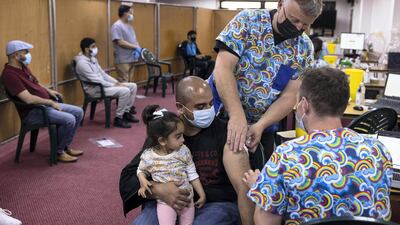Researchers have found that a delay of up to 10 months between doses of the Covid-19 vaccine developed by AstraZeneca and the University of Oxford can give more protection against the disease.
A study by Oxford scientists released on Monday found that a long interval between the first and second injections led to a better immune response.
They discovered more antibodies were generated by a delay of up to 45 weeks between the doses.
The results were described as encouraging news for developing countries that were left out of supply agreements with pharmaceutical companies and are now struggling to vaccinate their populations.
Volunteers in the latest study were drawn from Oxford’s original early and late-stage trials for the vaccine last year.
Thirty people who only received a single dose in the trial were given a second one about 10 months later.
Another 90 participants from those studies received a third dose.
All volunteers were between the ages of 18 and 55, because that was the group recruited at that stage of the trials last year.
Prof Andrew Pollard from the Oxford Vaccine Group described the immune responses in the study as “excellent”.
“This should come as reassuring news to countries with lower supplies of the vaccine, who may be concerned about delays in providing second doses to their populations,” Prof Pollard said.
“There is an excellent response to a second dose, even after a 10-month delay from the first.”
Scientists found that antibodies and T-cell responses were boosted significantly by a third “booster” shot.
Teresa Lamble, lead author of the study, which is not yet peer-reviewed, said the vaccine was “well-tolerated” by the body, with no major side-effects after three injections.
“It is not known if booster jabs will be needed due to waning immunity or to augment immunity against variants of concern,” Ms Lamble said.
“This is very encouraging news if we find that a third dose is needed.”
Britain was one of the first countries in the world to introduce a longer delay between vaccine doses, increasing the interval from three weeks to three months.
The reason was to give some level of protection against Covid-19 to as many people as possible.
The government is now encouraging people older than 50 to receive their second shots as soon as possible to protect against the Delta variant, cases of which are rising across the country.
In a separate study, alternating doses of the Oxford-AstraZeneca and Pfizer-BioNTech vaccines generate strong immune responses against Covid-19.
Researchers running the University of Oxford-led Com-Cov study say, both "mixed" schedules (Pfizer-BioNTech followed by Oxford-AstraZeneca, and vice versa) induced high concentrations of antibodies against the coronavirus spike protein when doses were administered four weeks apart.
The results show that when given at a four-week interval both mixed schedules induce an immune response that is above the threshold set by the standard schedule of the Oxford-AstraZeneca vaccine.
This means all possible vaccination schedules involving the Oxford-AstraZeneca and Pfizer-BioNTech vaccines could be used against Covid-19.

